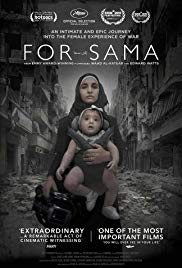
FOR SAMA
UK/ Syria, 2019, 96 minutes, Colour.
Directed by Waad Al-Kateab? and David Watts.
Sometimes a blogger will complain that a film was worthless and that that was 100 minutes of life that could never be recovered. On the other hand, there are some films that a reviewer should urge an audience to see, 100 minutes of life very well invested. This is a recommendation for For Sama.
With so many wars during the last decade, especially in the Middle East, in Africa, audiences can be overwhelmed, news headlines, images for television, a media bombardment, then gaps of time when little is seen or heard from a particular area, audiences sometimes wondering what has happened. And then another bombardment, more graphic media images. And, we sometimes remember, that while we are not hearing any immediate news, wars go on, day by day, suffering, injuries, hunger, oppression – and thousands of refugees.
And this is what For Sama is about. However, it is a film with a difference. A young Syrian student, Waad, goes to Aleppo for studies, gets caught up in the rebellion of 2010, becomes involved in the political action, takes her camera out into the streets and, over several years, films the people, the bombardments, the hospital work for those wounded, recording injuries and deaths. She has a great admiration for a local doctor, Hamza Al- Kateab (whose wife opts to leave as a refugee rather than stay with her husband). It is clear from the footage that Waad admires Hamza, so it is no surprise that, eventually, they marry.
Their daughter, Sama, is born in 2015. Her mother makes this film for her, for her heritage, the story of her father and mother, the siege of Aleppo, the suffering of the people.
Which gives the documentary an extra human touch, many sequences of Sama, baby, early months, beginning to walk, talk, become a child.
On the one hand, there is the violence of the bombardments, especially so many from Russian planes. There is the ever-encroaching advance of the military forces of the regime. Hospitals are bombed. Hamza finds an old building and transforms it, surgery and hospital care continue, even with limited means. There is an unexpectedly powerful sequence when a baby is born, seems lifeless, the hospital staff making every effort to shake and beat life into the child, seemingly impossible, but…
Finally, the military get closer to Aleppo, a family that we have got to know, whose life we have seen in detail, caring father, mother providing as much as she could, the children playing, getting a little education, yet referring to the grim details of the war and siege as ordinary parts of their conversation.
The film was nominated for an Oscar for Best Documentary. Whether we are familiar with the civil war in Syria over many years or whether it has not made such an impact on us, this is a documentary to be seen, a documentary to challenge, to elicit some understanding, a great deal of compassion.
This is very true of For Sama.
1. Acclaim? Awards? An important film about Syria, Civil War, survival?
2. The background of the war in Syria, the regime of al-Assad and his son, the current President? Corruption? Rebellion? Aleppo and the siege? The long years of the Civil War? Russian intervention and bombardment, the US and allies? The emergence of ISIS and the consequences? Sieges and surrender? The millions of refugees, deaths? The historical record?
3. The film over several years in the locations, Aleppo, people, their experiences, the bombardments, the hospitals, homes, and survival?
4. The spirit of the rebels, anti-regime? Anti-Russian?
5. The director and her story, her life, to Aleppo for study, taking part in the rebellion, helping Hamza? The hospital? Her photography, chronicling people and events? Hamza and his wife not staying? The director, her attraction, the wedding, the celebration, pregnancy, the birth of Sama? Bonding with the neighbours and the family, the interviews with the children and their taking Walker granted? The hospital, the work? Deaths, rebuilding, the new hospital?
6. The children, Sama and her birth, growing? The film for her, a heritage from her mother and father? The neighbours, their personalities, the stories, the children studying, playing, drawing? And the director’s second pregnancy?
7. The impact of the birth of the child, seeming to be dead, the strenuous efforts of the staff to revive the child, its coming to life?
8. Hamza, his personality, dedication, contacts, interviews, supplying news to the outside world?
9. The years of the siege, the difficulties, the hospitals bombed, the makeshift new hospital, the work and equipment, the waiting, the nearing of the regime’s military, lack of food and equipment?
10. Waiting, and eventually getting out, the impact of their being free – but at the mercy of the regime?
11. Audiences identifying with characters, situations, difficulties, survival? Compassion and social justice?